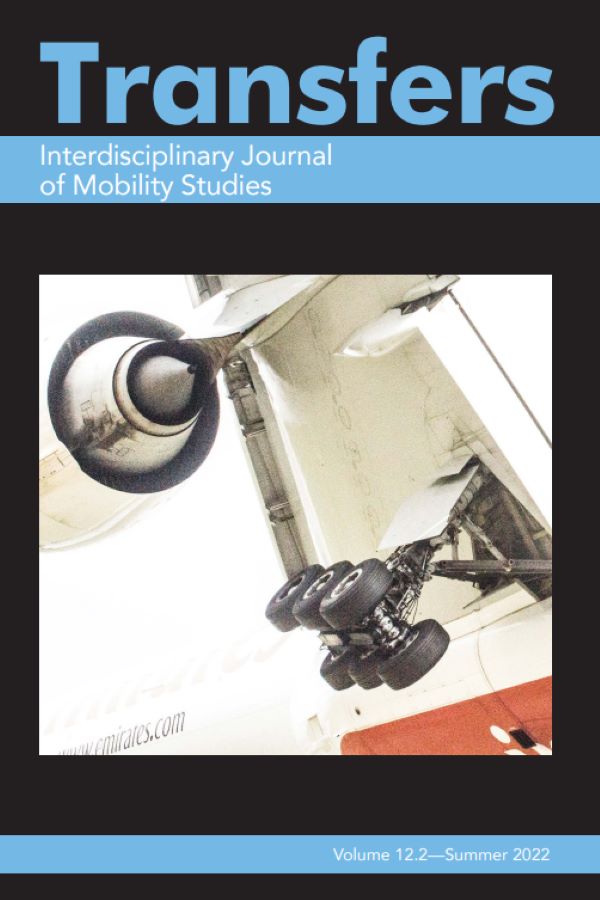
Transfers
Interdisciplinary Journal of Mobility Studies
ISSN: 2045-4813 (print) • ISSN: 2045-4821 (online) • 3 issues per year
Latest Issue
Volume 15 Issue 1
Editorial
The curse “may you live in interesting times” (erroneously attributed to China, probably dating to nineteenth-century Britain) is scourging a great many of us these days, as a wave of authoritarianism batters the political systems and civil societies of nations once committed to democratic values and norms. The authoritarianism currently gripping portions of Europe, Asia, Africa, and the Americas may well vary in its intensity and practices when compared to the mid-twentieth-century totalitarianism of, say, Nazi Germany and the Soviet Union, but it shares with those regimes a fear of people's mobility and a desire to control it.
Intimations of Artificial Intelligence and Individual Automobility
Bruno Latour's Aramis, or the Love of Technology
Bruno Latour's
Identity, Migration, and Transcultural Space
Sunjeev Sahota's The Year of the Runaways
The multi-fold developments in science and technology have led to enhanced mobility among people in the present times. The desire to have a better life impels migration to far off lands even when it involves facing alien, different cultures, and unknown people. The struggle to adjust and adapt to the new surroundings takes them along various paths filled with numerous challenges. This leads to the creation of a space for them that is transcultural, imbibing the characteristics of more than one culture and often perceived as embodying the promise of an escape from the existing complexities, constraints, and norms governing national and communal identities. However, cross-cultural conflicts as well as those due to the implications of gender have to be negotiated before one can hope to achieve a coveted kind of existence. Additionally, the caste factor is a major construct in the formation of identity particularly in the Indian cultural context where it is deeply embedded in the social set-up and determines the social norms. Its implications are vast and it continues to impact identity even as people migrate to the new land. Sunjeev Sahota in
Zlatý české ručičky and Technocracy in the Reintroduction of Trolleybuses in Prague, Czech Republic
In recent debates around the concept of technocracy, the issues of “technology” and “skill” (
What Is China?
Musicking, Sounding, and Mobility
Diao, Ying.
Kielman, Adam.
Novel Reviews
Sara Baume,
Chris Abani,
Civility and its Transgressions
Toward an Affective and Infrastructural Politics of Transit Etiquette
Civility and etiquette underpin how we are expected to move, where the mobile subject—particularly in transit mobilities—is conditioned and expected to perform in certain manners. In this article, I consider civility and etiquette as more than fixed codes of conduct but a contested and situated process that is both infrastructurally mediated and affectively charged. In the context of transit mobilities, etiquette is closely entangled with not only the ways mobile subject interacts with the infrastructures of mobilities but also the bodily and affective experiences of mobilities. Drawing on the intersecting conceptual lenses of affect and infrastructure, I seek to rethink civility and etiquette in relation to the politics of the body, investigating how socio-cultural norms of mobility are materialized or transgressed at the level of the body. Moreover, I argue that attention to transgression is crucial to uncovering the power dynamics that underlie and construct the norms of civility in transit, revealing an uneven geography of bodily comportment as well as a politics of mobility across intersecting social differences.